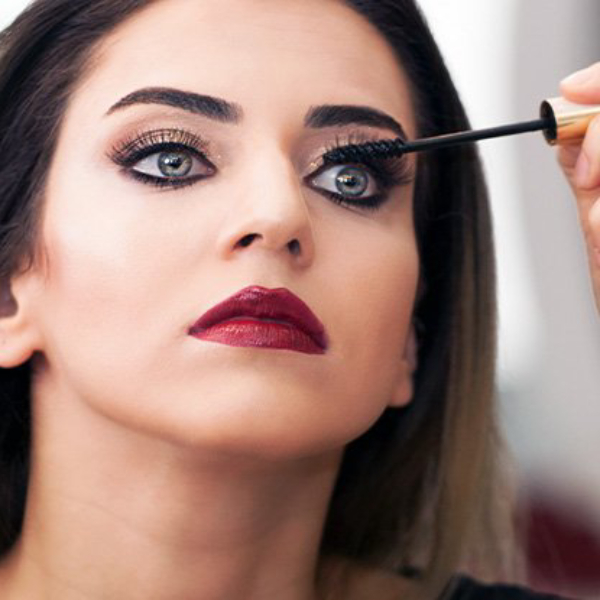The Importance of Removing Eye Makeup Before Bed
Many overlook the simple nightly routine of removing eye makeup, but it serves a critical purpose. When you sleep with mascara or other eye cosmetics on, the risk of causing harm to your eyelashes and eyes increases significantly. Just as you wouldn’t go to bed without brushing your teeth, taking off your eye makeup must become just as essential in your nighttime regimen. Sleeping with mascara on can lead to damaged eyelashes and irritate your eyes. It’s crucial to prioritize makeup removal as part of your nightly routine.

Leaving mascara on your lashes overnight can lead to several problems. The fragile hairs become stiff from the mascara, which can result in them breaking or falling out during your sleep. Your pillowcases also suffer, as they can collect the mascara that rubs off, leading to unnecessary laundry and potential skin irritations from leftover cosmetics.
More seriously, though, is the risk to your eye health. Eye makeup that isn’t removed properly often leaves residue that can clog the tiny hair follicles and oil glands on your eyelids. This can cause uncomfortable inflammation known as a stye or more serious conditions like blepharitis, a chronic eyelid inflammation.
To ensure your eyelashes stay healthy and your eyes stay clear of infection, it’s essential to remove eye makeup before bed. A gentle, yet effective makeup remover will help dissolve mascara and other makeup, making it easy to take off. Always avoid harsh rubbing, as this can push makeup debris into the eyes and under the eyelids, exacerbating risks of irritation or even infection.
Integrating this habit into your nightly routine not only preserves your eye health but your beauty as well. Healthy lashes are less likely to break, maintaining the full, lush look that mascara aims to create. By taking a few minutes to clean your eyes each night, you’re investing in both the immediate beauty of your eyelashes and the long-term health of your eyes.
Consequences of Sleeping with Mascara: A Case Study
A recent case study highlights why sleeping with mascara is risky. Doctors treated a woman who had not removed her eye makeup properly for 25 years. They found solid masses under her eyelids. These were from mascara build-up. If they got infected, she could have lost her sight. It’s crucial to maintain eye health by removing makeup daily. Additionally, how often should you change your mascara to prevent harmful build-up and infection?
This example is extreme but shows potential dangers. It’s not just about eyelash loss. There’s a risk of infections that could lead to blindness. Doctors removed the woman’s mascara buildup in 90 minutes. Yet, they could not fix the scarring left behind.
Using mascara safely means removing it every night. Protect your eyesight and your beauty. Let this case remind you of the harm you could avoid. Sleep with mascara on can lead to eye irritation and infections. Make sure to remove it each night to protect your eyes and maintain your beauty.
The Dangers of Mascara on Eyelashes Overnight

Leaving mascara on your lashes while you sleep can do serious harm. Overnight, mascara makes your lashes stiff and brittle. This can cause them to break or fall out. When your eyelashes break, they can take longer to grow back. This may leave your eyes looking bare and expose them to more dust and debris.
Mascara residue can also lead to blocked hair follicles and oil glands around your eyes. This blockage can cause inflammation, resulting in red, swollen eyelids or even styes. Styes are painful and can take days or weeks to heal. In severe cases, untreated styes can turn into more serious infections.
Another risk of sleeping with mascara is conjunctivitis, also known as pink eye. Mascara particles can flake off and get into your eyes, irritating the conjunctiva. This can result in redness, itching, and discharge. Pink eye is highly contagious and can quickly spread from one eye to the other or to other people. Sleeping with mascara on can lead to conjunctivitis, causing redness and irritation. It’s essential to remove makeup before bedtime to avoid such eye infections.
In the worst scenarios, sleeping with mascara on can cause corneal abrasions. These are scratches on your eye’s surface. They can happen if you accidentally rub your eyes in your sleep. Corneal abrasions are painful and can also lead to more serious eye infections. Sleep with mascara on can lead to painful corneal abrasions. It’s essential to remove makeup before bed to avoid potential eye infections and serious discomfort.
To avoid these dangers, always remove mascara before going to bed. Choose a gentle method that keeps your lashes and eyes safe. Remember, healthy eyes and lashes contribute to your overall beauty and wellbeing. So make sure to end your day with a clean, makeup-free face.
How Sleeping with Makeup Affects Your Eye Health
Sleeping with mascara on not only impacts your eyelashes, but it also poses a significant threat to your overall eye health. Every night, when mascara remains on your lashes, you’re at risk for a range of issues that go beyond simple eyelid irritation. Here’s a closer look at how nighttime mascara can affect your eyes:
- Dryness and Irritation: Mascara can cause your eyes to become dry and irritated. As the night progresses, particles from the mascara may flake off and enter your eyes, leading to discomfort and possible damage to the delicate eye surface.
- Increased Risk of Infections: The residue from eye makeup, especially when left overnight, can harbor bacteria. This environment is conducive to the development of eye infections, such as conjunctivitis (pink eye), which not only is painful but also highly contagious.
- Contact Lens Complications: For contact lens wearers, leaving mascara on can spell trouble. Makeup residue can stick to the lenses, causing irritation, and potentially lead to more severe eye problems if not addressed.
- Blocked Tear Ducts: Your tear ducts play an essential role in maintaining eye health by providing constant moisture and protection. Mascara left on overnight can clog these ducts, preventing them from functioning correctly and leading to dry, uncomfortable eyes that are more susceptible to infections.
- Potential for Scratches and Abrasions: As already mentioned, stiff and brittle lashes can break and the fragments can scratch the cornea. These scratches, known as corneal abrasions, are not only painful but can be gateways to serious infections.
To maintain the health of your eyes, it’s crucial to remove all eye makeup before bed. A clean face is a simple yet significant step towards safeguarding your vision and preventing avoidable eye health issues. Remember, taking care of your eye health is an investment in your overall well-being and beauty. If you’re wearing lash extensions, be cautious with mascara; it can clump and damage the extensions. Prioritizing eye health means choosing the right products for your lashes.
Proper Eye Makeup Removal Techniques
Proper removal of eye makeup is essential for maintaining healthy eyes and lashes. To ensure you’re doing it right, follow these steps:
- Use a Gentle Makeup Remover: Choose an eye makeup remover designed to be gentle on the sensitive skin around your eyes. Look for products labeled ‘hypoallergenic’ or ‘for sensitive skin’.
- Avoid Rubbing: Gently press a moistened cotton pad against your eyelid. Hold it for a moment to let the makeup dissolve. Avoid rubbing, as it can harm your lashes and delicate skin.
- Cleanse in the Right Direction: Wipe the cotton pad downwards on your lashes. This is the natural growth direction of eyelashes and helps prevent damage.
- Be Thorough but Gentle: Ensure you remove all makeup residue. Check for signs of leftover makeup and go over any missed spots with a fresh cotton pad.
- Mind the Waterline: The waterline can trap makeup, leading to irritation. Use a cotton swab carefully to clean this area, if necessary.
- Rinse with Water: After removing the makeup, rinse your face with water. This helps to wash away any remaining product and refreshes your skin.
- Moisturize: Don’t forget to moisturize the skin around your eyes after cleansing. It keeps the skin hydrated and helps prevent irritation or dryness.

Following these proper eye makeup removal techniques every night is a crucial step in avoiding the issues linked with sleeping with mascara on. Making this a habit will protect your eyelids and lashes from potential harm and contribute to your overall eye health. After a long day, ensure you remove your mascara properly; Sara once learned the hard way when her mascara leaked, causing irritation. Prioritize your eye health!
Preventing Mascara-Related Eye Infections and Irritations
Every night, sleeping with mascara on can pose risks of eye infections and irritations. Here’s how to prevent them:
- Keep Your Eye Area Clean: Always wash your face before bed. Make sure all mascara is gone.
- Choose Hypoallergenic Products: Use makeup and removers that are kind to sensitive eyes.
- Change Mascara Regularly: Replace your mascara every 3 to 4 months to avoid bacteria buildup.
- Handle Contact Lenses With Care: If you wear lenses, remove them before wiping off mascara. This prevents makeup from transferring onto your lenses.
- Maintain Good Eye Hygiene: Wash your hands before touching your eyes. Avoid sharing eye makeup with others.
- Watch for Signs of Infection: If your eyes are red, itchy, or swollen, see a doctor. You might have an infection.
By following these steps, you can greatly reduce the risk of developing problems from sleeping with mascara on. Healthy eye care habits keep infections and irritations at bay, ensuring your eyes stay safe and comfortable. To avoid complications, it’s essential to never sleep with mascara on. Maintaining a proper nighttime routine will help protect your eyes from irritation and infections.
The Long-Term Impact of Neglecting Eye Makeup Removal
Neglecting to remove eye makeup can cause long-term damage. Over time, ignoring this important step may result in chronic eye conditions and weakened overall eye health. Here are some of the long-lasting effects that could occur:
- Increased Risk of Clogged Oil Glands: Makeup can block the oil glands around your eyelids, leading to lasting dryness or recurrent styes.
- Permanent Lash Damage: Continuous wearing of mascara can make lashes permanently brittle and prone to breakage.
- Skin Aging Around the Eyes: Makeup residue can contribute to the development of wrinkles and fine lines by stretching delicate skin.
- Chronic Eye Infections: Prolonged exposure to bacteria-laden mascara can lead to reoccurring eye infections.
- Sensitivity and Allergic Reactions: Over time, the constant contact with eye makeup residue may heighten sensitivity, causing ongoing allergic reactions.
- Dry Eye Syndrome: Mascara can interfere with tear production, potentially resulting in chronic dry eye syndrome.
Makeup removal should be a nightly ritual to safeguard against these issues. A few extra minutes spent on eye care before bed is worth the effort to maintain healthy and vibrant eyes for years to come. Sleep with mascara on can lead to irritation and damaged lashes. Prioritizing eye care each night ensures your eyes remain healthy and beautiful for the long term.
Best Practices for Eye Makeup Hygiene
Maintaining optimal eye makeup hygiene is essential for healthy eyes. Follow these best practices to effectively care for your eyes:
- Clean Brushes and Applicators: Wash your makeup brushes and applicators regularly. This prevents bacteria from spreading to your eye area.
- Discard Old Makeup: Throw away expired makeup, especially mascara. Old products can harbor harmful bacteria.
- Never Share Eye Makeup: Sharing can lead to cross-contamination. Always use your own makeup products.
- Wash Your Hands: Before applying or removing makeup, wash your hands. This reduces the risk of transferring germs to your eyes.
- Be Gentle with Application: Apply makeup gently to avoid damaging the delicate skin around your eyes.
- Avoid Makeup on the Waterline: Putting makeup on your waterline can block oil glands. This can lead to irritation.
- No Makeup with Irritated Eyes: If your eyes are irritated, skip the makeup. This gives your eyes time to recover.
- Remove Makeup Before Sleeping: Always take off your makeup before bed. Sleeping with makeup on can cause serious issues, as we’ve discussed.
By incorporating these eye makeup hygiene habits into your routine, you can help protect your eyes from infection and irritation. Sleep with mascara on can lead to infections and irritation, so always remove your makeup before bed. Prioritizing eye hygiene contributes to long-term eye health and beauty. Remember, the effort you put into caring for your eyes today can lead to long-term benefits for your eye health and beauty.